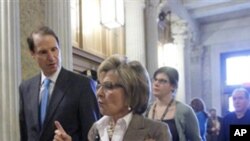A partisan stalemate over U.S. federal spending continues, after the Senate voted down both Republican and Democratic bills to fund the government for the next six months. The votes came nine days before the government’s authority to spend money expires, resurrecting the specter of a shutdown of many federal operations.
The Republican bill, already approved by the House of Representatives, would have slashed current spending by about $60 billion - what Republicans called a first step towards eliminating America’s trillion-dollar federal deficit. Democrats countered with a bill containing more modest cuts in domestic non-security spending. As had been predicted for days, neither measure got 50-percent backing, much less the three-fifths support needed to advance.
Republicans insisted deep spending cuts are needed to slow the expansion of a $14 trillion national debt and save the nation from fiscal ruin. Senator Mike Johanns of Nebraska said, "The interest payments on our debt will increase to almost $1 trillion by 2020 [on thecurrent fiscal path]. The American people are absolutely appalled at trillion-dollar annual deficits. Just imagine their horror at trillion-dollar annual interest payments."
Democrats countered that proposed Republican cuts in education, infrastructure projects, and numerous federal programs are short-sighted and would strangle America’s fledgling economic recovery.
Senator Claire McCaskill of Missouri said, "It is completely wrong that we would do massive, massive cuts right now with our economy in the position that it is. That would cause just as big a crisis as our failure to deal with our long term structural debt."
With Congress deadlocked on current-year spending, let alone planning for next year, some senators blasted both parties for putting forth bills that had little chance of passing. West Virginia Democrat Joe Manchin said, "Why are we engaging in this political theater? Why are we voting on partisan proposals that we know will fail? That we know don’t balance our nation’s priorities with the need to get our fiscal house in order?"
Republican Rand Paul of Kentucky voted against both bills, saying neither seriously addresses America’s debt problem. "Both alternatives [bills] are inadequate. I don’t think either side recognizes the enormity of the problem or the imminence of the problem," he said.
Several senators urged greater White House involvement in budget negotiations. Vice President Joseph Biden met with congressional leaders of both parties for budget talks last week. White House Press Secretary Jay Carney says the president wants to find common ground to fund the government for the rest of the fiscal year, with substantial spending cuts.
Republican House Speak John Boehner issued a statement saying his party will remain focused on reducing federal spending.
Without a budget deal or another temporary funding extension, the federal government’s spending authority runs out next Friday.
US Budget Stalemate Continues
